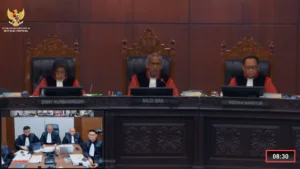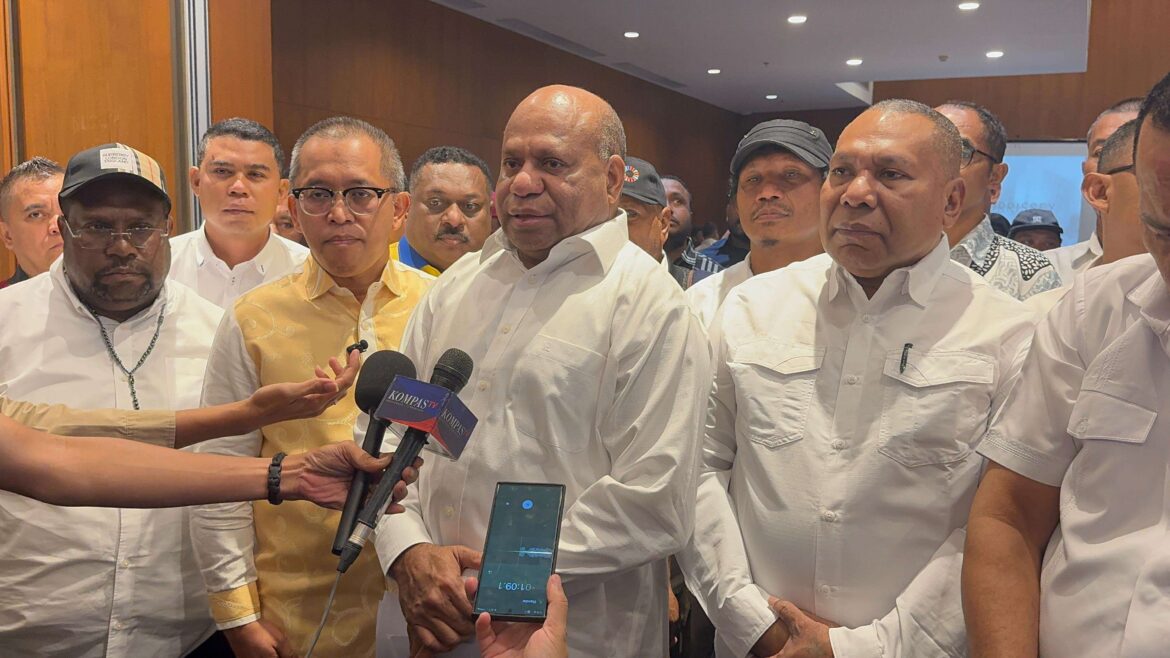The echoes of democracy once again reverberated from Papua to Jakarta as Indonesia’s Constitutional Court (Mahkamah Konstitusi, MK) delivered its final word on one of the most closely watched regional elections of recent years. On September 17, 2025, the Court dismissed the petition filed by Benhur Tomi Mano and Constant Karma, who challenged the results of the repeat election (Pemungutan Suara Ulang, PSU) for Papua’s governorship.
With this ruling, Mathius D. Fachiri and Aryoko Alberto Ferdinand Rumaropen stand as the legally confirmed governor and deputy governor of Papua for the 2025–2030 term. Yet beyond the immediate political outcome, the decision reflects something deeper: the steady maturation of Indonesia’s democratic processes, even in regions as complex and contested as Papua.
From Contestation to Confirmation: A Democratic Journey
Papua’s 2024 regional election was always destined to be historic. The province, often marked by political tension and social fragility, became the stage for a democratic drama that tested not only the candidates but also the resilience of Indonesia’s electoral institutions.
Initially, the pairing of Tomi Mano and Yermias Bisai emerged victorious. But the triumph was short-lived. The Constitutional Court later found that Yermias had falsified his domicile information, a clear breach of election law. The consequence was decisive: disqualification and a mandate for a repeat election.
In the subsequent PSU held on 6 August 2025, Tomi Mano paired with Constant Karma to contest against Mathius Fachiri and Aryoko Rumaropen. The results were extremely close. Mathius–Aryoko secured 259,817 votes, while Tomi–Karma collected 255,683. The difference of just over 4,000 votes underscored how every ballot carried weight in Papua’s political future.
Yet the losing side refused to concede. Allegations of fraud, inflated voter lists, and government interference were brought before the Constitutional Court. It was here that the strength of Indonesia’s democratic machinery was tested.
The Court Speaks: Upholding Legitimacy

The Constitutional Court, after weeks of hearings and careful examination, rendered its judgment: “menolak permohonan pemohon untuk ”seluruhnya”—rejecting the petition in its entirety.
The Court’s reasoning carried important implications:
- No systemic fraud was proven. Allegations of “terstruktur, sistematis, masif” (structured, systematic, and massive violations) failed to meet the threshold of evidence. Democracy, the Court reminded, cannot be undermined by unsubstantiated claims.
- Voter list anomalies lacked basis. Petitioners argued that in some areas participation exceeded 100 percent. The Court, however, noted that the number of voters during the repeat election was in fact lower than in the initial poll, undermining accusations of manipulation.
- Abuse of power claims were unconvincing. Allegations that state officials, including ministers, improperly influenced the vote were dismissed. Visits by public figures did not constitute unlawful campaigning.
By affirming the Papua election results, MK demonstrated that democratic disputes in Indonesia can find closure within the rule of law. In a province where political grievances often spill into the streets, this legal resolution was more than symbolic. It was a lesson in the maturity of democratic institutions.
Democracy on Trial in Papua
Papua has long been portrayed as one of Indonesia’s most politically fragile regions. Issues of separatism, social inequality, and limited infrastructure often intersect with electoral politics. In such an environment, skepticism about whether democracy can truly function is not uncommon.
The 2025 gubernatorial election thus became a litmus test. Could the province hold a fair and transparent election? Could institutions handle disputes without violence? Could rivals respect the rule of law?
The answer, as it turns out, was yes—though not without challenges. The close margin, heated rhetoric, and legal battles all reflected the tensions inherent in a vibrant democracy. Yet the ultimate reliance on judicial arbitration, and the acceptance of MK’s ruling as final, signaled that democratic norms are indeed taking root, even in Papua.
Voices for Peace and Reconciliation
The Court’s ruling did not end with a legal pronouncement. It sparked a chorus of calls for unity across Papua.Governor-elected Mathius Fachiri, in his first statement, emphasized that “this is not the victory of one candidate pair, but the victory of the Papuan people.” His message resonated with the need for reconciliation after months of division.The Speaker of the Papua People’s Assembly (Majelis Rakyat Papua, MRP), Nerlince Wamuar Rollo, urged all sides to accept the verdict. “The MK’s decision is final and binding. We call upon every citizen to respect it for the sake of peace and development in Papua,” said one spokesperson.Civil society voices, such as the Papua Peace Network (Jaringan Damai Papua, JDP), highlighted the importance of reconciliation. “What we need now is not more division, but healing. Elections should be moments to strengthen democracy, not fracture society,” a spokesman of JDP, Yan Christian Warinussy, told local media. Besides that, Yan Christian Warinussy emphasized that the Constitutional Court’s decision on the Papua gubernatorial election dispute has permanent legal force that must be respected by all parties.Even national political actors weighed in. The Golkar Party, whose leaders supported Mathius–Aryoko, invited all Papuans to set aside political differences. Idrus Marham, a senior figure, declared, “This is the time to unite, because Papua’s development and welfare are larger than politics.”
A Victory Beyond the Ballot: Maturity of Democracy
While Papua’s gubernatorial election has now reached its conclusion, the significance of the process extends far beyond the boundaries of the province. The episode stands as a vivid demonstration of Indonesia’s democratic maturity in action. At the heart of this lies the resilience of institutions. The Constitutional Court once again proved its role as the guardian of electoral integrity, grounding its verdict not in politics or public pressure but in evidence and legal reasoning. In doing so, it strengthened public trust in the judiciary as a fair and impartial arbiter of disputes.
Equally important was the way the contest was resolved. In Papua’s past, disputed elections have too often spilled over into unrest, testing the stability of both local communities and national cohesion. This time, however, the conflict found resolution within the courtroom rather than the streets. The shift from confrontation to lawful adjudication is a clear sign that Indonesia’s democratic culture is continuing to evolve.
Another measure of this democratic maturity lies in the acceptance of finality. The Court’s decision is binding, and although disappointment among supporters of the Tomi–Karma camp is understandable, the broader recognition of the verdict underscores a collective respect for the rule of law. Legitimacy in a democracy, after all, must rest on rules rather than emotions.
The razor-thin margin of victory also highlights another dimension of democratic progress: accountability. When elections are decided by just a few thousand votes, winners are reminded that their mandate is not absolute. They are compelled to govern inclusively, seek consensus, and ensure that every citizen feels represented—a responsibility that strengthens the democratic process itself.
Finally, the Papua election showed that democracy is not confined to Indonesia’s political heartland. National attention was fixed on this regional contest, signaling that what happens in Papua resonates throughout the archipelago. The peaceful and lawful resolution of the dispute reaffirmed that democracy is alive and thriving, reaching even the most geographically distant and politically complex corners of the nation.
Challenges Ahead: Governing with Legitimacy
For Governor Mathius Fachiri and Deputy Governor Aryoko Rumaropen, the hard work begins now. Their legitimacy is unquestioned, but legitimacy must be matched with performance.
Papua faces urgent challenges: improving healthcare and education, reducing poverty, expanding infrastructure, and addressing security concerns in conflict-prone areas. Governing in a post-election landscape also requires extending hands to political rivals.
A mature democracy is not measured only by fair elections but also by inclusive governance. If Mathius and Aryoko can bridge divides and deliver tangible progress, the 2025 election will be remembered not just as a test of democracy but as a turning point in Papua’s development journey.
Lessons for Indonesia
The Papua election dispute carries broader lessons for Indonesia as it continues to evolve as the world’s third-largest democracy. One important takeaway is that even in remote and politically sensitive regions, credible elections can take place when institutions function as they should. Papua’s experience shows that democracy is not confined to the political center in Jakarta but extends across the vast and diverse archipelago.
Equally significant is the reminder that legal frameworks matter. The disqualification of Yermias Bisai for falsifying his domicile illustrates how technical violations, often overlooked in the heat of campaigns, can dramatically alter political outcomes. Compliance with rules is not optional in a mature democracy; it is the foundation that ensures fairness and legitimacy.
Finally, Papua’s case underscores that democratic maturity is not a destination but a journey. Each election dispute that is resolved through lawful processes, rather than through unrest or violence, strengthens the democratic fabric of the nation. By channeling disagreements into the courtroom instead of the streets, Indonesia demonstrates that its democracy, though still young, is steadily growing stronger and more resilient.
Conclusion
The Constitutional Court’s ruling on Papua’s gubernatorial election may have closed one chapter of political contestation, but it opened another chapter of democratic affirmation. The election tested the limits of Papua’s institutions, the patience of its citizens, and the resilience of Indonesia’s democratic framework.
In the end, democracy prevailed—not because it was perfect, but because institutions worked, citizens respected the process, and leaders called for peace.
As Papua looks ahead, the challenge is to transform electoral legitimacy into inclusive governance and lasting peace. For Indonesia, the episode stands as evidence that democracy, though often noisy and contested, continues to mature, even in the most complex corners of the archipelago.
The true victory, then, is not only for Mathius and Aryoko, nor even for their supporters. It is a victory for the people of Papua and for Indonesia’s democracy—a democracy that, step by step, is growing stronger, fairer, and more resilient.


